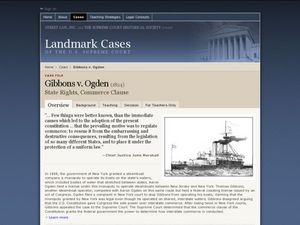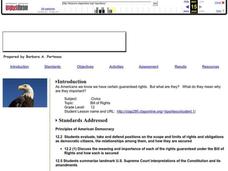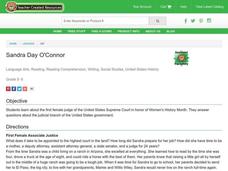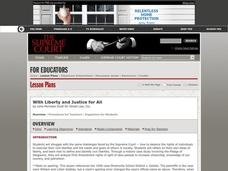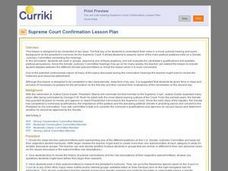Curated OER
Justice For All?
Students study about President Bush's nomination of federal appeals court judge John G. Roberts to the Supreme Court. They compare coverage of the nomination in different sections and articles in The New York Times.
Curated OER
Brown v. Board of Education
Students examine school segregation and equal protection laws. In this Supreme Court instructional activity, students examine primary documents from Brown v. Board of Education and discuss the implications of the decision.
Curated OER
Mapp v. Ohio (1961)
Students examine warrantless searches and due process. For this Supreme Court lesson, students examine primary documents from Mapp v. Ohio and discuss the implications of the decision.
Curated OER
Gibbons v. Ogden (1824)
Students examine state rights and the commerce clause. For this Supreme Court lesson, students examine primary documents from Gibbons v. Ogden and discuss the implications of the decision.
Curated OER
Bill of Rights
Twelfth graders list, describe, and illustrate the specific rights guaranteed to individuals and how they are secured. Then they examine landmark Supreme Court cases, such as, Airport Commissioner vs. Jews for Jesus, New Jersey vs. TLO,...
Curated OER
Texas v. Johnson
Students examine the freedom of speech. In this Supreme Court lesson, students analyze primary documents from Texas v. Johnson and discuss the implications of the decision regarding flag burning.
Curated OER
Sandra Day O'Connor
No unit on important women in history would be complete without a activity on Sandra Day O'Connor. After reading background information about the first female Supreme Court justice, middle schoolers engage in several activities...
Curated OER
Miranda v. Arizona (1966)
Students examine Miranda v. Arizona. In this court decisions lesson, students analyze the self incrimination case and read other supplemental articles about police procedures and due process. Students discuss the Supreme Court decision...
Curated OER
United States v. Nixon (1974)
Young scholars examine checks and balances. In this Supreme Court lesson, students examine primary documents from United States v. Nixon and discuss the implications of the decision.
Curated OER
With Liberty and Justice for All
High schoolers examine the role of Supreme Court justices. In this judicial branch lesson, students consider the civil rights and civil liberties as they investigate Minersville School District v. Gobitis (1940) and West Virginia State...
Curated OER
Dred Scott v. Sandford
Young scholars examine the issues of slavery and due process. In this Supreme Court lesson, students examine primary documents from Dred Scott v. Sandford and discuss the implications of the decision.
Curated OER
The Race to Learn
Students explore the history of education and race in the United States. By researching Supreme Court cases dealing with race and education, students examine the ways in which these cases have reflected changing social and cultural norms.
Heritage Foundation
Procedural Rights: Amendments VI, VII, and VIII
Even in court, your class members have procedural rights provided by the amendments. Teach high schoolers this important lesson by using the 18th installment of a 20-part unit exploring the US Constitution. The resource provides several...
Curated OER
iCivics: Court Quest
Learners explore the responsibilities of the Supreme Court. In this judicial branch lesson, students play an online game that requires them to respond to questions regarding the Supreme Court's responsibilities.
Curated OER
Supreme Court Confirmation Lesson Plan
Young scholars consider the responsibilities of Senate Judiciary Committee members. In this judicial hearings lesson, students participate in a mock Supreme Court Confirmation and discuss the outcome.
Ohio Center For Law-Related Education
Four Activities: Thurgood Marshall and the Nomination and Confirmation of Federal Judges
The process of nominating and confirming federal judges can sound like a lot of bureaucratic hoops, but a resource breaks down the steps of the Supreme Court nominations in a simpler manner. Learners participate in four activities that...
Judicial Learning Center
The Power of Judicial Review
Marbury v. Madison is arguably the most important landmark case in the history of the Supreme Court. A fact-filled lesson provides background information about the case and two others related to the concept of judicial review. Scholars...
Administrative Office of the US Courts
US v. Alvarez
Is it illegal to lie about military service? Discuss the ways the First Amendment affects the Stolen Valor Act with a lesson that focuses on the Supreme Court case U.S. v. Alvarez. As high schoolers learn more about the history of the...
State Bar of Texas
Baker v. Carr
Can the federal government override the state government to protect the citizens of the United States? The 1962 Supreme Court case Baker v. Carr outlines the issue of equal protection under the law. Scholars investigate with a short...
State Bar of Texas
Dred Scott v. Sandford
Who decides someone is not a real person? Scholars investigate the Dred Scott v. Sandford court case which deals directly with slavery and citizenship. After viewing a short video clip, classmates work in pairs to assess and discuss the...
State Bar of Texas
Schenck v. US
Freedom of speech is absolute—or is it? The Supreme Court case Schenck v. United States has learners research what free speech really looks like. A short video along with paired work creates open discussion and thought on what speech is...
State Bar of Texas
Sweatt v. Painter
Is separate but equal actually equal? The 1950 Supreme Court case Sweatt v. Painter discusses the law of segregation and inequality. Scholars investigate the impact of the case on the desegregation of public schools across the nation...
State Bar of Texas
Hernandez v. Texas
What if the jury is not made up of people from your ethnicity or background—are they still considered your peers? Scholars analyze the impact the Supreme Court case Hernandez v. Texas had on jury selection across the nation. Paired...
State Bar of Texas
Grutter v. Bollinger
A university decides not to allow a qualified scholar to enter its institution based on skin and gender—but this case is about a white female? The 2003 Supreme Court case Grutter v. Bollinger lays the foundation for open discussion and...
Other popular searches
- Supreme Court Cases
- Supreme Court Case Studies
- Supreme Court Justices
- The Supreme Court
- Landmark Supreme Court Cases
- Supreme Court Decisions
- Supreme Court Rulings
- Corporations Supreme Court
- Writing Lesson Supreme Court
- Michigan Supreme Court
- Supreme Court Nominations
- Famous Supreme Court Cases





